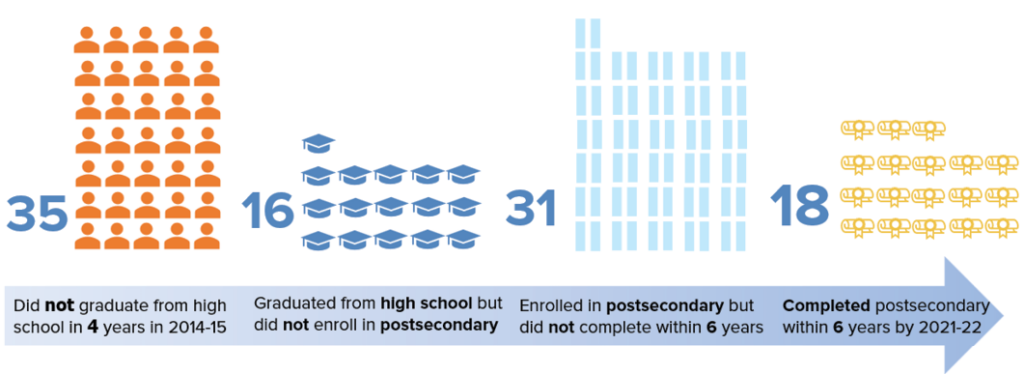
On Thursday, October 24, 2024, Education Policy Initiative Director Chelsea Coffin testified before the D.C. Council Committee of the Whole at its vocational education hearing. Her testimony focuses on strengthening Career and Technical Education (CTE) and other work-based learning opportunities, more robust reporting for CTE programs, and data systems that can support this. You can read her testimony below, or download a PDF copy.
Data from the American Community Survey (ACS) indicate low early career outcomes for D.C.’s public school alumni, underscoring the need to strengthen connections to CTE and work-based learning programs. For example, while D.C. lacks comprehensive data on high school alumni earnings, ACS data reveal that young adults aged 18 to 34 who were born and currently reside in D.C. earn an average of about $34,000 annually—$37,000 less than the $71,000 earned by similarly-aged young adults who were not born in D.C. The unemployment rate for these young adults who are D.C. natives is 23 percent, compared to 3 percent for non-native residents in the same age group. Additionally, only 24 percent of D.C.-born residents of this group have a bachelor’s degree or higher, which is 53 percentage points lower than similarly aged non-native D.C. residents.1
Figure 1. Early Career Outcomes for longtime D.C. residents and peers who moved to D.C. after birth as young adults

These disparities highlight the importance of identifying strategies to improve early career outcomes for D.C.’s public school alumni and ensure they are better prepared for college and careers. A 2021 survey by CityWorks DC and Bain & Company of over a thousand alumni of District of Columbia Public Schools (DCPS) and public charter schools in D.C. found that gaining career assets (or the tools, skills, experiences, and competencies that help effectively navigate post-high school life) through CTE or other work-based learning during high school can boost earnings, by 16 percent for youth with a bachelor’s degree and 64 percent among other postsecondary degree holders (including associate’s and other certifications).2
Figure 2. Access to career assets improve the incomes of multiple post-secondary degree holders

There is increased interest and investment in programs that can help improve college and career outcomes, but there is limited information on what works and whether existing programs are balanced and accessible. Our forthcoming research found that while D.C.’s public school students have opportunities to explore and prepare for a career, they have relatively fewer ways of launching a career after graduating high school, even in careers that do not require a postsecondary degree (and three-quarters of public school alumni are likely to choose a pathway that does not involve a bachelor’s degree, Figure 1). In addition, students are not always aware of existing programs, cannot always fit them in their schedule, and do not always have the right incentive to take advantage of these programs. This bill can help to make these programs more relevant to young people by linking participation in them to graduation requirements and by requiring strong communication to families and students through counselors, for example.
We can only know if these programs are working if we have more detailed reporting, and more information on actual student outcomes. The bill has significant reporting requirements but not any allowance to collect indicators to measure program effectiveness. D.C. needs to better follow alumni through the work of the ETE Data System and other initiatives. While D.C.’s public school students spend fifteen years preparing for what comes next, the city only currently monitors postsecondary degree completion at the systems level3 —and this shows that 18 out of a cohort of 100 9th graders will complete a postsecondary degree within six years of high school graduation (see Figure 3).4 It is critical to track the other 82 percent of alumni, and create a better longitudinal data system like ETE that connects data across agencies and schools to show a picture that no single entity has—for example, to show who enrolls in CTE courses, obtains industry-recognized credentials or certifications, and is then employed after graduation as outlined in this bill.
Figure 3. Out of every 100 students in D.C.’s 2011-12 ninth grade cohort…

Strong data from the ETE can support research by OSSE, the DC Education Research Collaborative, and others like the D.C. Policy Center to find out what’s working and improve approaches to ensure all of D.C.’s alumni have a strong start to their early careers.
Endnotes
- Ruggles, S., Flood, S., Sobek, M., Backman, D., Chen, A., Cooper, G., Richards, S., Rodgers, R., and Schouweiler, M. IPUMS USA: Version 15.0 American Community Survey 5-Year Estimates, 2018-2022. Minneapolis, MN: IPUMS, 2024. Retrieved from https://doi.org/10.18128/D010.V15.0
- Calma, E. 2021. D.C. high school alumni reflections on their early career outcomes. D.C. Policy Center. Retrieved from https://www.dcpolicycenter.org/publications/early-career-brief/
- Coffin, C. and Rubin, J. 2021. Measuring early career outcomes in D.C. D.C. Policy Center. Retrieved from https://www.dcpolicycenter.org/publications/measuring-outcomes/
- Coffin, C. and Mason, H. 2024. State of D.C. Schools, 2022-23: Challenges to pandemic recovery in a new normal. D.C. Policy Center. Retrieved from https://www.dcpolicycenter.org/publications/state-of-dc-schools-2022-23/
